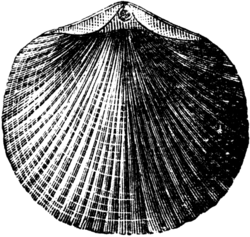Top Qs
Timeline
Chat
Perspective
Thunder Bay Limestone
Geological Formations From Wikipedia, the free encyclopedia
Remove ads
Thunder Bay Limestone is a geologic formation in Michigan that preserves fossils dating back to the Middle Devonian and is the uppermost formation of the Traverse Group.[1]
Remove ads
Description
Summarize
Perspective

The name for the formation originates from the description of strata near the "south cape of Thunder Bay" by C. C. Douglas in 1841, this area also represents the type locality of the formation. Due to negligence by multiple later workers, the area was later referred to as the Partridge Point Formation by Warthin & Cooper in 1935. It wasn't until 1943 that Warthin & Cooper would rename the formation back to its original name.[2]
The type locality (Locality 30-8-11 SE) is the largest outcrop of the formation, exposing six units that have a total depth of about 4.8 meters. These units are largely made from light-colored limestones though the bottom-most unit has bluish limestone. The most unique unit would be unit 3 which mostly is made up of grey shales that grades into granular limestone at the surface.
The environment that the formation represents is a shallow carbonate platform with large amounts of coral and shelly fauna. Later formations show an increase in depth as water levels raised in the Eastern Interior seaway. Over time, the seaway would develop a stratified water column. Eventually, younger formations, like the Squaw Bay limestone, would show a deep basin environment.[3]
Remove ads
Paleobiota
Anthozoa
Brachiopoda
Bryozoa
Conodonta
Echinodermata
Mollusca
Placodermi
Stromatoporoidea
Tentaculita
Trilobita
Remove ads
See also
References
Wikiwand - on
Seamless Wikipedia browsing. On steroids.
Remove ads





























